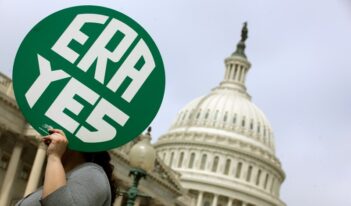
Despite recent skepticism, the President’s broad authority over federal contractors will remain.
The President can set rules and conditions for federal contractors by executive order. Administrations of both parties use this power to advance important policies such as barring discrimination based on race, gender, and religion, mandating paid sick leave, and regulating the minimum wage.
Recently, however, some federal courts have taken a narrower view of the President’s power over procurement. But as Governing for Impact has argued in a recent issue brief, setting rules for federal contractors remains a broad and important tool despite increasing judicial skepticism.
The procurement power has long been understood to come from the Federal Property and Administrative Services Act (FPASA), which aims to establish an “economical and efficient” system for federal contracting. According to longstanding judicial consensus, contractor rules are permissible so long as they bear a nexus to these twin values.
But other courts have cast doubt on that settled view. In response to an unprecedented Biden Administration rule requiring millions of federal contractors’ employees to receive a COVID-19 vaccine, the U.S. Courts of Appeals for the Fifth, Sixth, and Eleventh Circuits have questioned the President’s procurement power. According to these courts, FPASA governs only the contracting process; it does not empower the President to issue rules designed to make the contractors themselves more efficient and economical. And in light of the “stunning” scope of the vaccination mandate, they also invoked the major questions doctrine.
This reading of FPASA, if accepted broadly, would undermine the legal basis for countless settled contractor rules. Many, both inside and outside the Administration, are understandably worried about FPASA’s future.
But the procurement power remains vital. The Biden Administration and subsequent ones should continue to use it, while also taking steps to mitigate the risk that a contractor rule might be struck down.
Despite judicial pushback, federal policymakers should not abandon FPASA. A survey of cases interpreting FPASA shows that a majority of U.S. Courts of Appeals do so broadly, in line with the decades-old consensus that contractor rules with a nexus to the goals of efficiency and economy are permissible. Recent judicial skepticism should be understood, at least in part, as a reaction to the sweep of the expansive contractor vaccination mandate. By requiring millions of individuals to obtain a particular medical treatment, the mandate was considerably broader than typical FPASA orders governing only the conduct of federal contractors themselves. Moreover, since the reasoning of the skeptical U.S. Courts of Appeals would nullify generations of contractor rules, we expect most courts—perhaps even the Supreme Court—to be reluctant to accept it. Indeed, the Biden Administration’s other signature FPASA initiative, a new contractor minimum wage, has stood up well in court. Given all that, our view is that policymakers—even those worried about anti-administrative judicial headwinds—should not give up on FPASA.
Policymakers can increase the chances that a contractor rule survives judicial review by justifying FPASA rules with robust factual records and showing how a rule improves contractor operations and the overall procurement system. In addition, agencies should use best practices to address judicial challenges, such as drafting FPASA rules to be severable.
Most importantly, federal agencies should prepare for major questions doctrine challenges. The major questions doctrine stands for the proposition that courts must not interpret statutes as delegating questions of significant political or economic importance without clear congressional authorization. In the FPASA context, the government will have the tools it needs to defend against major questions claims.
FPASA is not a “mousehole” or a “little-used backwater.” Nor would a typical FPASA rule qualify as an impermissibly novel expansion of regulatory authority. To the contrary, FPASA is a broad statutory grant of discretion to “prescribe policies and directives that the President considers necessary.” Putting aside that the proprietary act of deciding who to do business with is not “regulatory” at all, there is a long tradition of the executive branch imposing rules and conditions on federal contractors.
Furthermore, the Supreme Court regularly reinforces that the President possesses the entire executive power. The Biden Administration should consider whether the President has inherent constitutional authority to set the terms for the federal government to conduct business with contractors.
There are doctrinal and practical reasons for continuing to use FPASA for setting federal contractor rules. Despite some U.S. Courts of Appeals’ recent skepticism, FPASA’s broad authority should remain the established rule. And as a strategic matter, FPASA is one of the best tools in the federal arsenal to ensure workplace justice. Those who favor that value should not give FPASA up until forced to.




